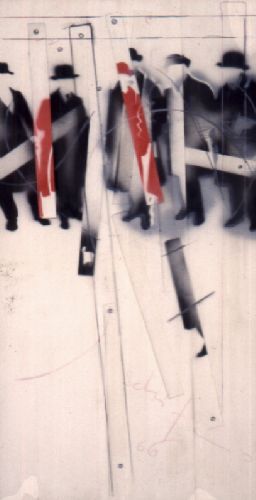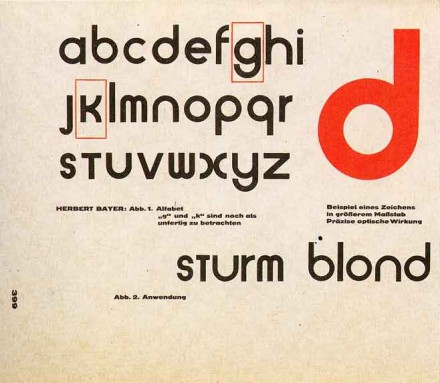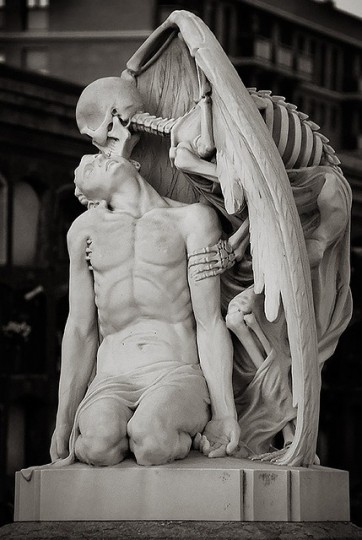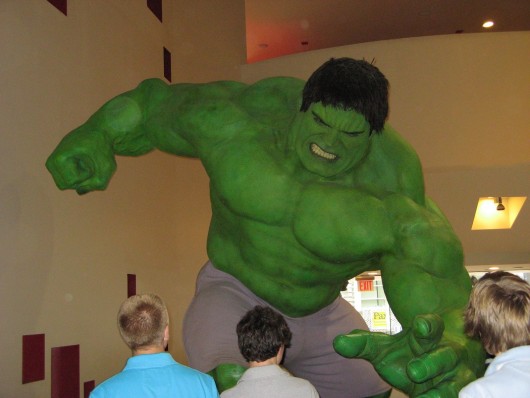
There is a new piece at Monthly Review that addresses exactly the issues that motivated me to start this blog.
I have spent a lifetime in the arts; the majority in theatre as playwright and director and even as artistic director of several companies, but also as a screenwriter and TV writer, free lance and for several painful years as a staff writer. In all that time, the one thing that has never left my mind, that was, in fact, constantly placed before me, was the truth that the system, the producers of this vast cultural apparatus, were in the business of killing art. And they were in that business because art destabilizes and awakens consciousness. It may not directly foment revolution, but without it, the sheep are a lot easier to lead to the killing floor.
“One function of the entire cultural apparatus at any given period has been to internalize in men of subordinate position the idea of a necessary domination of some men over others, as determined by the course of history down to the present time. As a result and as a continually renewed condition of this cultural apparatus, the belief in authority is one of the driving forces, sometimes, productive, sometimes obstructive, of human history.”
Horkheimer
The article then quotes Marcuse:
“The phenomenon of cultural identification demands that the problem of “cultural cement” (Kitt) be discussed upon a broader basis. One of the most important factors involved here is the leveling of the former avantgarde-oppositional forces with the cultural apparatus of monopoly capitalism (the transformation and application of psychoanalysis, modern art, sexuality, etc. in the work and entertainment process). First and foremost the effect of “Kitt” within the working class should be investigated: “scientific management,” rationalization, the interest of the worker in increased productivity (and with it, in the intensification of exploitation), strengthening of nationalistic sentiments.”
This last quote is from an obscure and previously lost paper that was only recently translated. But it speaks directly to what I believe is an issue of huge importance and which for a variety of factors, is not really examined. I believe part of the problem lies in how the apparatus has promoted certain thinkers and made of them public intellectuals (though that term is not used anymore). Again to speak from personal experience; I have found that the most intense and rigid plantation system in the entire cultural apparatus is the academy, the University. Nowhere is intellectual and moral curiosity so squashed. It is common currency to ridicule mass media, TV and film especially, and while it is true that craven financial criteria and motivation drives the industry, the structure of this vulgar and sort of lurid industry is hardly hidden, and in fact the mercenary personality of shlock meisters like Jerry Bruckheimer is openly admitted, even bragged about, and where pop-guru creators like Joss Whedon or J.J. Abrams are fetishized, and that their managerial acumen is applauded and even identified with, there is something also very transient and temporary about these figures and their creations. Far more pernicious is the vaulted appeals to eternal veracity found in the academy. In a system run ever more like a Hollywood film studio, the presentation remains arch serious, almost parodic in its clinging to the near medieval accoutrements of the University. Nowhere does one find such a fetishizing of titles and degrees, and with a caste system that almost prides itself on its lack of flexibility or self examination.

Jerry Bruckheimer
The cultural apparatus is so huge today that even finding a comprehensible approach is difficult. I would perhaps argue, however, that one avenue or lever to be used is to view the evolution of US culture via the evolution of University encroachment on creativity. The avant garde (and this is no doubt going to be addressed in the second part of that Monthly Review piece) has been neutralized by this system of corporate product and its hegemonic distribution — by the corporate products domination of the “market” …in a sense by the creation of a market, even. The often missing piece in the analysis of culture is the University.
To return to Marcuse, in a letter from the 1940s. to Franz Neumann, he wrote…
“One decisive result is the emphasis on the fact that
social change cannot be interpreted within a particular social
science, but must be understood within the social and natural
totality of human life. This conception uses, to a large extent,
psychological factors in the theories of social change. However,
the derivation of social and political concepts from the “psyche” of
man is not a psychological method in the modern sense but rather
involves the negation of psychology as a special science. For the
Greeks, psychological concepts were essentially ethical, social and
political ones, to be integrated into the ultimate science of
philosophy.”

This tendency toward de-specialization is typical of all the Frankfurt School thinkers. It also shares something of the same vision of culture that Norman O.Brown expressed; that the whole point of art and culture is to change man, and change society. That culture is also philosophy and politics, and that from one perspective, it is the totality of human life. It is certainly the totality of social life. The University lurched further toward research, and the specialization that goes with that. But there is something else lurking in all this, and it surfaces in other letters of Marcuse, and that is questions about goals. The very raising of this question is itself both a question and answer. Is the goal happiness? Is that what drives the desire for social change…a vision of the individual human’s happiness? What is happiness? And does the question not imply, somehow, something of an instrumental logic? Are we not now constructing questions that assume a structural consensus on *progress*?
![[no title] 1994 by Thomas Schütte born 1954](http://john-steppling.com/wp-content/uploads/2013/07/schutte-two-heads-e1372702364604.jpg)
I dont know if any of these questions really ask for answers. The answers that are attached, or contained within the question itself, though, deserve notice. For they impinge on a very Marxist reading of political economy. On private property, and its deleterious effect on humankind. In one sense these ideas all come together around Aristotle, and his notions of movement from lower to higher in all forms of life. It is Christian of course, too. We are headed ‘toward’ something. It is here that Vedantic thought enters as the anti-Aristotelian view of life as part of a natural cycle of returns. Dougles Kellner (who edited the collected papers of Marcuse)wrote in a sort of introductory overview of Marcuse’s early work:
“Marcuse and Neumann present Hegelian philosophy, much as Marcuse did in Reason and
Revolution, as a critical rationalism which combined radical impulses with conservative ones. The
dialectical method is praised “as an adequate theoretical structure capable of coping with the
dynamic character of modern society. Social change is no longer a particular event within a rather
static reality, but the primary reality itself from which all stasis must be explained. The
interpretation ofsocial change becomes identical with the theory of society.” Marx is presented as
the theorist who best develops Hegel’s dialectical method in conceptualizing contemporary social
antagonisms. For Marx, “theproblemofsocial change is not a problemwithin the prevailing form of
society, but of the substitution of this society for a socialist one.” This Marxian position would
guide Marcuse’s thinking until theend of his life, and Neumann presumably shared this perspective
at that period of time.
Marcuse and Neumann thus propose a systematic examination of ancient, medieval, and
modern theories of social change with a view toward developing a theory of social change for
contemporary society. The distinctive feature of classical theories of social change for themis the
interconnection of sociological, political, and psychological factors. “The true order of human life
embraces all three realms” and “the laws ruling that order” are similar. They note that modern
sociology “has severed the intrinsic connection between the theory of society and philosophy which
is still operative in Marxism and has treated the problem of social change as a particular sociological
question.” They propose, by contrast, to integrate philosophy,sociology, and political theory in a
theory ofsocial change.”
For the purposes of what I am trying to write about, there was a comment made by Marcuse in an early study from the late 1940s…
“After the military defeat of Hitler-fascism (which was a premature
and isolated form of capitalistic reorganization) the world is
dividing itself into a neo-fascist and a soviet camp. The still existing
remains of democratic-liberal forms within both camps are being
rubbed away, or are being absorbed by them. The states, in which
the old ruling class has survived the war economically and
politically, will become fascist in a foreseeable time, while the
others will enter into the Soviet camp.”

Herbert Marcuse
With the fall of the Soviet Union, and the escalation of U.S. interests in the world economy, the conclusion one comes to now, in 2013, is that the West has now entered into a full fascist state structure. And one of the tools of sustaining this hierarchical world order is the now gigantic apparatus of mass communication. The culture industry is now, really, an industry for the total occupation of consciousness.

The overriding sense one has today is of what Marcuse called the leveling of oppositional forces within culture and art (the avant-garde)is that of enclosure. In retrospect, there was a point reached sometime in the last thirty years, and perhaps only twenty, where language itself, as well as image and its codes was completely compromised — when the relationship between traditional notions of meaning and symbol had been erased or at least blurred. The corporate takeover of mass culture was mirrored by the sclerosis and petrification of and in the monopoly control of education.
The rise of marketing was so acute that the takeover happened without anyone fully appreciating its degree.
The world order contained only systems anathema to liberatory social development. Running alongside these competing totalitarian ideologies was the further integration of working class consciousness into capitalist cultural models. One of the realities I have continued to see over the last thirty years, and more acutely over the last fifteen to twenty, has been that no amount of oppositional organizing finds any traction against this tendency of integration. Even the most radical community level organizing suffers from a cultural co-opting by the mass apparatus of the dominant power. This is often obscured by the invisibility or camouflaging of form. The enclosing of oppositional art, of avant garde movements in art, by this vast hegemony of distribution, and by the domination and control in how artworks are presented to the public, how their form mediates their content, have seemed to resist all attempts at creating oppositional works that can sustain their impact. There are now so many mechanisms for co-option that individual expression is defeated before it even begins. An image or story point or beat is borrowed, sampled, or simply stolen — and reappears as a deodorant commercial two weeks later.
In the last election, Obama’s font choice (Gotham) for his ads and billboards and press packets, was more meaningful than anything he said, and in truth the analysis (Hillary’s fuddy duddy New Baskerville, and McCain used Optima…which actually I rather like) surrounding those choices contained far more cogent political substance than anything actually said during the campaign.

Another aspect of this trend has been educational — and philosophical. Post modern theory has often, in concrete terms, served to legitimate this colonizing by Capitalist forces. The University embraced theory in terms akin to Hollywood studio executives looking for this season’s *new* commodity; intellectual trends were shopped within an elitist system of domination, of collaboration with Capital. There is, of course, scant agreement on what *post modern* really means, but what there is no argument about is that academic cooperation with corporate funding yielded a diluted and mushy sort of theoretical jargon that served to create multiple logical cul de sacs of meaningless babble. Some of this was foreshadowed by otherwise somewhat reactionary thinkers like Baudrillard, whose analysis of hyperrealism turned out to be pretty prescient.
Marcuse is accused (by Kellner, among others, and as was the Frankfurt thinkers overall) in ignoring the idea of democracy. In fact, I suspect their distrust of democracy under capitalism was exactly right. Today we have only a political theatre that generates a good deal of distraction for the masses, but cannot and will not, ever produce real social change. I suspect that it is in cultural work and education that some of the pre-conditions for radicalizing the populace might be found. It is equally possible, however, that culture itself is now simply so contaminated by the prevailing values of the ruling class, that aesthetic resistance will suffer the same fate as electoral politics.

Marcuse believed that capitalism would become fascism. He is accused of being wrong in this, when actually he was quite right. It is only that this is a new brand of fascism. I have heard recently terms such as “soft totalitarianism”, and while I understand what is being said, the reality is that there is nothing soft about it, only that there is a new ‘presentation’ of this truth — it is happy face totalitarianism. It is kitsch fascism. The style codes, as I suggested in my last entry on this blog, have changed, and that within the parameters of these new styles of domination, a good deal of distraction is injected. It is an impaired over all reading of the world around us that has taken place. There are many ways this occurs — the normalizing of cognitive dissonance, the normalizing of a highly reductive reading of narrative and a systematized encouragement to de-link content, or simply erase it. The inability to learn tools of comparison that runs together with revisionist models of history. This is the new *realism*, a sort of adumbrated ability to extract moral or ethical lessons from the material world. It is a de-emphasizing of the material, or often just the elevation of the immaterial — things which are NOT there but are given equal value to what IS there. Partly this has been the currency of thinkers (sic) such as Zizek, with his intentional misreading of Marx, Lacan, and Freud. He is hardly the only one, however. Radical feminists, or radical race and class analysis goes unmarketed, and becomes (as part of the apparatus’ technique for control)an object of ridicule and is stigmatized. That which is without a Brand is adrift in this new marketplace of ideas. The powerful impetus for consensus serves as a reflex reaction to what is not commodified somehow. The latest intellectual trend must create market shares or suffer being ignored.
Fan culture permeates all of daily life under Capital. Someone decades back said you cannot fall in love under Capitalism. This is true not just in sexual genital life, but in the sensual interaction with culture itself, broadly speaking.
Kellner writes of Marcuse:
“The aesthetic dimension was
always an integral part of Marcuse’s vision of liberation and he always believed that great art
inspired the quest for a better life, projecting visions of a freer and happier existence. The aesthetic
dimension thus animated the”great refusal” of oppressive social conditions.”
Life today in the advanced West is one of total surveillance, of marketed fear, under which personalities suffer private anxiety and self doubt. The presentation of self (per Goffman) has become joined to a reality TV vision of rewarded optimism, and the shaming of those unable to sustain this performance. The epidemic of anti-depressant use speaks directly to the demand for “happiness”. And like the need to present an image of success by mortgaging your savings to buy new commodities to put on display, the individual mortgages his consciousness to put on display a commodified self that is happy and optimistic and without pain. Those in pain, those who suffer, are shamed and cast out. They are advised to seek help — 12 step programs, psychiatric treatment, or Yoga….anything that will demonstrate both remorse and a recognition that they have recognized their “problem”. In fact, there is a sort of self branding as “victim” that has become a fall back strategy when treatment is called for. People want you to know “how hard it was, how difficult their journey to adjusted normalcy” and then they will carefully police your response lest you somehow affront their hard earned (and paid for) victimness. The vast US gulag is only the material mirror to a psychic gulag every bit as sadistic and punitive.
The complete marketing of electoral politics has quite possibly suggested the end to a certain incarnation of democratic values. Bourgeois democracy followed Nixon with Reagan and then Carter, Bush, Clinton and finally Obama. Nothing in any of these pseudo elections has for a nano-second interrupted the advance of social domination, the colonizing of daily life by the state. With Obama the ultimate Brand has been installed as the final draconian measures of totalitarian state control are put in place. From NDAA to PRISM to extra legal assassination and the open targeting of dissenters, and the criminalizing of opposition, all come together to provide evidence for the new final stage of Capitalist-fascism.
Now, nothing is ever total. Even today, organizing takes place, and there is actually in some sense a growing recognition of the irrationality of modern life under Capital. One of the problems, though, is how this opposition dissipates — why it dissipates — and that possibly the missing element in movements of resistance is aesthetic.
This is not to suggest that somehow learning to distinguish between corporate kitsch and more serious artwork is going to create a revolution, but it might be essential in some way to sustaining a sense of autonomy under a system of domination. The apparatus that works at nothing so diligently as it works at creating addictions, creating needs for identification with celebrity and commodity cultural items, has seen that work reach a degree of hegemony where all discourse, almost all critical language is borrowed and put on display as part of the Spectacle. For artists, the challenge is to create work that cannot be, at least immediately, absorbed and repackaged as the next *new* thing. Learning to develop a critical vocabulary is crucial to even being able to start discussing these things.

There is a secondary aspect to developing critical grammar, to reclaiming a language of liberation, and that has to do with the wholesale violence of the society as it now stands. The constant uninterrupted orgy of violence that the corporate media presents as entertainment is deeply internalized now. It runs together with white supremicism and patriarchy. Capitalism has always be joined at the hip with conquest and physical domination of both nature and the ‘other’. Violence against women, against the poor, and the most vulnerable in general is now openly applauded and rewarded. And it is now made into entertainment. It is this worship of authority —for the official state religion of western democracies, especially the U.S., is AUTHORITY, that is the primary ideological building block of state propaganda.
Item 1. https://www.commondreams.org/headline/2013/06/26-8
The cosmetic trappings of authority are marketed and on display everywhere one turns. From movies and TV to sports to advertisements for military heroism, it is a culture of naked jingoism, and it sells a product of pure punishment and cruelty. As the material violence against the poor has been ratcheted up, as police powers are now close to complete, and where state impunity has actually been made into law, the master narrative almost ceases to matter on one level.
It is not read as a narrative, its simply read as Nature. This almost omnipresent violence also expresses itself in an increasingly voyeuristic sexuality that is pinned to deep repression and feelings of powerlessness. The most acute contradiction under Capital today is the puritanism of the official morality police, and the retail selling of sex in every possible configuration, but especially in an objectified sadism against women. Almost 100% of advertising somehow includes sex as a trope or image — and almost 100% of official state pronouncements on sex is puritanical and repressive. The individual body as your personal armor, as a carapace or shell of hardness, is now constantly placed as the ideal. The soft interior, exemplified by the female body, is both desired and hated. There is always a toxic patina of guilt attached to depictions of sexuality in mass media. The soft center, hidden, moist and fertile is to be conquered and dominated, just as the state dominates the individual, so the individual must dominate his desire. Against all this the oppositional artwork must strive to survive.
Once the avant garde movements in art served as conscience, and as expressions of the possible. They functioned as more than just political critique, or to puncture the hypocricies of Capital — they awakened individuals to ideas of an existential nature. Existential in the sense that there is in great work a palpable sense of suffering and pain, and of the tragic sense of life. Of death.

The individual’s own trauma is re-created in narrative. Even image, even abstract image contains a narrative. One of the job descriptions for mass culture is to destroy the individuals connection to culture and art, in part by replacing it with ersatz commodity versions that reproduce anti human and anti life versions of the self, and that valorize and normalize violence (especially against woman and the poor)and that stigmatize and mock anything suggestive of autonomy. Autonomy is an illness, a sickness and an abnormality. This is where a psychoanalytical reading of social domination is acutely important. The psychiatric profession has become (largely) an organ of the totalitarian state and chemical warehousing a quick control mechanism. Coupled to this, as I said above, is the stigmatizing of those who refuse to be “adjusted”. Unhappiness is second only to poverty as a Capitalist sin. For movements of resistance, it would seem crucial to learn that sorrow and grief and melancholy are healthy signs of an autonomous human being.
As Paul Haeder observed recently “Our faces and skeletons are changing with each decade of denatured soil, Genetically Altered Burgers, and slimy High Fructose Corn Syrup delights.”
Boxtox and anti depressants and steroids and constant plugged in electronic data scrolling across our sub-conscious has created coming generations that will deftly finger pick their touch screens but be unable to know empathy or righteous indignation. I recently watched a friend’s two year old (!!!) using a touch screen cell phone with far more dexterity than I can, and this is a child who cannot yet speak. The cultural avant garde is not going to foment social change by creating a masterpiece. As Artaud said “No more masterpieces!”. The change comes from small incremental awakenings. These may include being able to internally sample some of that constant stream of hyper branded screentime, or studio film, and it may be by making an effort to access work not distributed by Time Warner or Clear Channel or SONY. I have always felt there is something puritanical on the left when it scolds people for thinking an episode of Breaking Bad is actually great. I happen not to think that, but I understand, and its most important to know that none of this is about what “I like” or “you like”. That’s shopping. Lists of “my top ten films of the year” or “my favorite child actors”, or “the ten best late night jokes of the year”, etc etc etc…..this is when fan culture supercedes actually experiencing the artwork…even experiencing the commodity. I say this because nobody escapes. You can’t escape. The only escape is crawling into a mountain cave in northeast Bhutan…and EVEN THEN you cannot escape. Because you dream. And you speak in your dreams, and all attempts to escape, to live a life of perceived “purity” are doomed naive attempts to retreat into some nostalgic onanistic world of your own making, eating organic non GMO food and never watching TV. But it’s far too late for that. The dream is dreaming us, now. The resistance must take the form of subsuming the apparatus itself (which relates to that Monthly Review piece I mentioned). We speak a bastard tongue of corporate totalitarianism, and that psychic space in which mimetic re-narrating occurs is mostly occupied 24/7 by one media conglomerate or another. It is a hopeless undertaking to parse the authentic from the kitsch, because they are cross contaminated, now. Our psychic life is like a wheat field next to a GMO test site and cross fertilization started thirty years ago. We are not robots, yet, though. Not quite.
The need is for cultural movements to work, in a sense, supporting ideas of integrity. Its all but impossible, if one is a writer, struggling, in theatre or prose, to get a play up and then find an audience of some sort and one day, as happened to me, a William Morris agent shows up and wants to sign you. And next thing you are offered ten times your previous lifetimes earnings to write a Bruckheimer script. Do you do it? Of course you do it. Sadly, it’s often not really the money. Its simply the seduction of power, or recognition. Mass recognition. This is a significant factor in how mass culture has altered the individual project, the individual’s desire to create. And this is why the Marxist material reading of kitsch matters. I may often disagree with it, find it overly simplistic or even puritanical — but its important to know that seven media corporations control the cultural product for 80% or western humanity.
And those media giants are in bed with other media giants that all participate in the destruction of life on the planet.
Yet, there is still a refusal to be made, even while taking the Man’s money. It may curb your future earnings, but one has to refuse something, at some point. I’ve always thought part of this is memory. Remember why you wanted to create in the first place. For children, its magic.

Marcuse, in 1966
“(in advanced capitalist socieities…)a progressive transfer of power
from the human individual to the technical or bureaucratic apparatus,
from living to dead labor, from personal to remote control, from a machine or group of machines to a whole mechanized system…Personal
life is now planned and orchestrated with the lives of others, from
above, by the machine itself. The individuals “live in a society where
they are . . . subjected to an apparatus which, comprising production,
distribution, and consumption, material and intellectual life, work and
leisure, politics and fun, determines their daily existence, their needs
and aspirations”

The repression in this culture fuels the violence. Our identification is with an external authority, or aggressor, and with our own image. Our own Brand, our presentation of this objectified being we call *I*. And this being extends to commodities, to cars, and shoes and iPhones and perfume or hair styles. It even extends to “lifestyle”. We are libidinally attached to this phantom self. And when the contradictions are too great, the outlet is either terrorists, or welfare mothers, or homosexuals or illegal aliens. Our own image now, however, has taken on an even further distancing from the material world. We can create, and do, identities for various cyber locations. And this ranges off into another huge topic. For now, the summation is in a sense, oppositional feelings, beliefs, and theory, as well as cultural praxis, cannot simply participate in the Spectacle, the giant apparatus of culture, (and you do and will participate, you have no choice) but you must learn a new grammar, a vocabulary of resistance, and it must first be founded on NOT appealing or courting the world of fans, of selling, of popularity. The excuse is always *art is communication*…..NO ITS NOT. So, why be popular? The smiley face culture crosses disciplinary boundaries. Quality of audience, not quantity. And those small sparks of awakening have to be enough. For now anyway.


Love the critique of ‘post-modern’ – I have argued that we are still in the ‘modern’ period for a long time… But it is hip to be post!
Anyways, I am printing this out and reading it proper, and will give a expositive comment after a thorough reading. 🙂
What I’m about to say may not relate directly to the above piece, although I will share my thoughts in due time.
So to go back to my discussion of the term “bourgeois”, I think the issue is the word has almost been rendered meaningless throught overuse, much like the word “gay” for instance, like “that’s so gay man”, a pejorative term used to describe anything someone disapproves of. The point isn’t about whether someone should be bourgeois or proletarian. Rather, what counts is to be authentic, and I’m sure you agree, although that is a somewhat broad generalization I will admit. Is it bourgeois to enjoy skiing? Is it “bourgeois” to love literature or to enjoy traveling to India? Yes, I know what the term bourgeois is understood to mean in a socio-economic/1789 sense, but it’s devolved into an impulsively utilized insult. I’m not referring to your use of the term specifically, John, but rather to the fact that “bourgeois” has become a catch-all term to describe anything that could be construed as “elitiist” by any given party, whether it be elitist in an intellectual sense or in a socio-economic sense.
http://www.commondreams.org/further/2013/07/01-2
and remy, i shall answer this shortly, but also the last comment on the previous thread.
Here’s something that may interest you, John:
http://www.finalcall.com/artman/publish/Perspectives_1/article_9681.shtml
“The repression in this culture fuels the violence”
If that’s what you believe, why do you have such a problem with Haneke then? Because that’s what most of his films are really about: the problem of repression and its social consequences.
Maybe it’s time for us to move beyond the repression thesis and start considering the problem of indulgence and regression ala Stiegler.